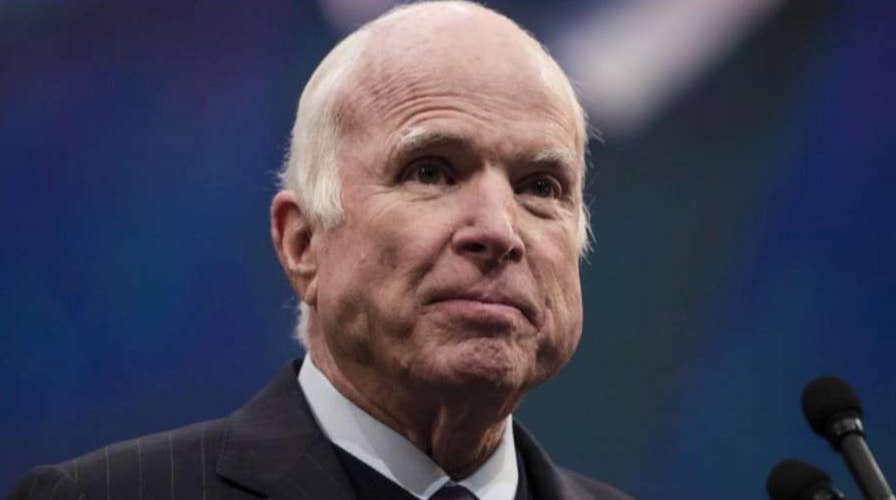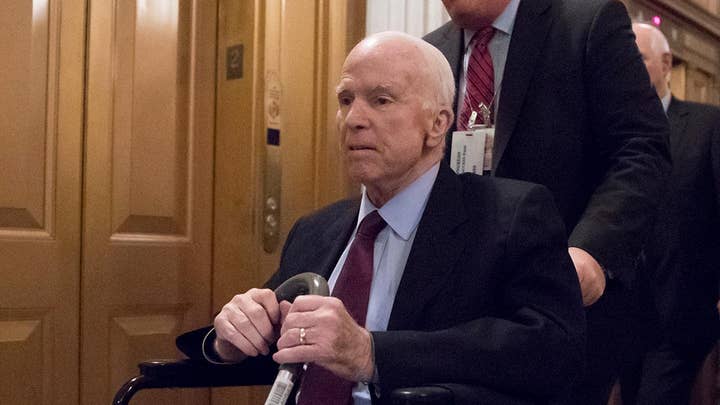Sen. John McCain no longer seeking medical treatment
Republican Senator John McCain was diagnosed with glioblastoma, an aggressive brain tumor, in 2017. In a statement, the McCain family says the senator has chosen to discontinue medical treatment.
Arizona Republican Sen. John McCain, the self-styled "maverick" of the Senate who has served three decades in Congress, will discontinue medical treatment for brain cancer, his family said in a statement Friday.
The Vietnam War veteran, who survived five years as a prisoner of war and went on to become his party's presidential nominee in 2008, was diagnosed last July with a brain tumor following a procedure earlier in the year to remove a blood clot from above his left eye.
He has not voted since last December. In Friday's statement, his family revealed how the disease has worsened:
“Last summer, Senator John McCain shared with Americans the news our family already knew: he had been diagnosed with an aggressive glioblastoma, and the prognosis was serious. In the year since, John has surpassed expectations for his survival. But the progress of disease and the inexorable advance of age render their verdict."
They said, "With his usual strength of will, he has now chosen to discontinue medical treatment."
Reaction poured in after the family's announcement.
"The entire McCain clan is doing exactly what the McCains have done through generations — rise to the meet the challenge," said South Carolina Republican Sen. Lindsey Graham, a close McCain friend.
"John McCain is an American hero, always putting country before self. From Vietnam to the halls of the U.S. Senate, the spirit of service and civility that has guided Senator McCain's life stands as a model for all Americans, regardless of political affiliation," Arizona Gov. Doug Ducey said in a statement.
Senate Majority Leader Mitch McConnell, R-Ky., tweeted: "Very sad to hear this morning’s update from the family of our dear friend @SenJohnMcCain. We are so fortunate to call him our friend and colleague. John, Cindy, and the entire McCain family are in our prayers at this incredibly difficult hour."
The Mayo Clinic Hospital in Phoenix last summer said that the original blood clot was associated with a primary brain tumor, known as a glioblastoma.
McCain, 81, has served in the U.S. Senate for more than two decades and ran for president twice. He lost the GOP nomination to George W. Bush in 2000 and was the Republican nominee in 2008 before losing to Barack Obama in the general election.
McCain was a prisoner of war in Vietnam for more than five years. Injuries from being tortured left him unable to lift his arms above his head.
Last December, McCain returned to the Senate for the first time since his brain cancer diagnosis. He delivered powerful remarks on the Senate floor addressing the need for bipartisanship amid gridlock in the chamber.
“Make no mistake, my service here is the most important job I have had in my life. And I am so grateful to the people of Arizona for the privilege—for the honor—of serving here and the opportunities it gives me to play a small role in the history of the country I love,” McCain said, acknowledging senators he’s “known and admired.” “But they knew that however sharp and heartfelt their disputes, however keen their ambitions, they had an obligation to work collaboratively to ensure the Senate discharged its constitutional responsibilities effectively.”
McCain has criticized the Senate’s deliberations in the last year, calling them “more partisan, more tribal” than any time he remembered.
McCain blamed “both sides” for the lack of cooperation.
Earlier this year, McCain penned a memoir titled “The Restless Wave: Good Times, Just Causes, Great Fights, and Other Appreciations,” written by himself, and Mark Salter, who had collaborated with McCain on all seven of his other books.
"I don't know how much longer I'll be here. Maybe I'll have another five years. Maybe, with the advances in oncology, they'll find new treatments for my cancer that will extend my life. Maybe I'll be gone before you read this. My predicament is, well, rather unpredictable," he wrote. "But I'm prepared for either contingency, or at least I'm getting prepared. I have some things I'd like to take care of first, some work that needs finishing, and some people I need to see. And I want to talk to my fellow Americans a little more if I may."
McCain, who has repeatedly been at odds with President Trump and criticized his rhetoric and leadership, said this year that he doesn’t want the president to attend his funeral, and prefers that Vice President Pence be there instead.
Last week, Trump signed a $716 billion defense policy bill, titled “John S. McCain National Defense Authorization Act for Fiscal Year 2019,” though did not mention the senator.
The Associated Press contributed to this report.














































